|
|
|
Sort Order |
|
|
|
Items / Page
|
|
|
|
|
|
|
| Srl | Item |
| 1 |
ID:
190348
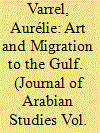

|
|
|
|
|
| Summary/Abstract |
This article presents an alternative narrative about the role of transnational migration in Gulf societies, that was developed in the contemporary art scene. It was presented in 2016–17 in the shape of an exhibition at the third Kochi-Muziris Biennale of Contemporary Art in Kerala, South India and explored how contemporary art can provide a space of freedom to address certain delicate issues in the Gulf context. The exhibition was put on by a collective based in Dubai, but was presented abroad at a Biennale located in the state of Kerala that is famous for its massive outmigration to the Middle East. The article examines how this context of production influenced the contents presented at the Biennale, and considers how it may have been received.
|
|
|
|
|
|
|
|
|
|
|
|
|
|
|
|
| 2 |
ID:
144914
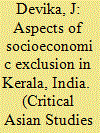

|
|
|
|
|
| Summary/Abstract |
This article probes the intersection of spatial, caste, and gender axes of power in shaping contemporary inequalities in Kerala, through mixed-method research in an urban slum. Relying largely on qualitative data, it constructs a history of work in the slum for lower caste men and women against the backdrop of Kerala politics from the 1940s until the present. It examines the role of widening gender gaps, the persistence of secularized caste, and flagging working-class politics and discourse in shaping contemporary socioeconomic exclusion in urban areas.
|
|
|
|
|
|
|
|
|
|
|
|
|
|
|
|
| 3 |
ID:
151137
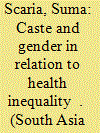

|
|
|
|
|
| Summary/Abstract |
This article is based on a micro-level village study in
Kerala, the southernmost Indian state with its long-standing
impressive basic indicators in health, economic growth and social
development. Using the theoretical perspective of ‘cultural inflation
of morbidity’ for a hypothesis of continuing inequities in health
outcomes, it examines how far such impressive basic indicators have
actually translated into equity in health outcomes, defined in terms
of incidence of morbidity and morbidity pattern. Confirming the
hypothesis, the findings discuss to what extent both caste and gender,
separately and together, may be continuing today to mediate health
outcomes in a changing socio-economic environment.
|
|
|
|
|
|
|
|
|
|
|
|
|
|
|
|
| 4 |
ID:
155045
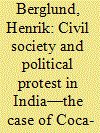

|
|
|
|
|
| Summary/Abstract |
The Indian economic and political systems have recently opened up for increased foreign investments, which has resulted also in new forms of popular resistance. This article analyzes the campaign launched against the Coca-Cola-Company in Plachimada, Kerala, India, which in 2004 resulted in the closure of its bottling factory after accusations of water depletion and pollution. The analysis in the article is based on the theoretical concept “political opportunity” and concludes that the decision to close the plant was the result of an efficiently run popular campaign based on a tightly knit group of local activists, held together by a tribal identity. Vital for the success was also the help the group attracted by national and international civil society support groups and media, as well as the link between both media and civil society towards the political parties and the state.
|
|
|
|
|
|
|
|
|
|
|
|
|
|
|
|
| 5 |
ID:
114013
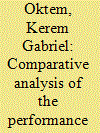

|
|
|
|
|
| Publication |
2012.
|
| Summary/Abstract |
This article compares the fortunes of the government coalitions under the leadership of the Communist Party of India (Marxist) or CPI(M) in Kerala, West Bengal and Tripura. The pattern of development and the success of the coalitions differ. In Kerala, the Left has lost every other election, whereas in West Bengal and Tripura, it has won many consecutive elections. West Bengal has seen stagnation in terms of human development, whereas Kerala and Tripura turned-to different degrees-into model states for human development. It is argued that the reasons for these different paths are to be found in the different strategies followed by the regional party units. Developmental success has been delivered through a mobilisation-based approach which has been followed inKerala and Tripura, but given up in West Bengal. This study explores thethree cases and elaborates on the reasons for the choice of strategies in the three states.
|
|
|
|
|
|
|
|
|
|
|
|
|
|
|
|
| 6 |
ID:
177788
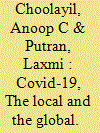

|
|
|
|
|
| Summary/Abstract |
This article offers a cross-sectional exploration of the COVID-19 containment strategy in Kerala and highlights its initial effectiveness in the Kasaragod district, the first to record a second stage transmission in the state with a cluster of cases from 23 March 2020 onwards. Despite its underwhelming healthcare infrastructure, Kasaragod district managed to contain the transmission and record a 100 per cent recovery rate, indicating a promising model of infection control. However, the district subsequently succumbed to community-level transmission when another wave of positive cases of COVID-19 was detected among repatriated overseas citizens on 7 May 2020. The article explores the confluence of elements that allowed the initial successful recovery from a second stage transmission and then examines the factors that later led to community-level transmission. Given the close connections of Kerala to other parts of the world through migration, the article illustrates how precariously the local is now part of the global.
|
|
|
|
|
|
|
|
|
|
|
|
|
|
|
|
| 7 |
ID:
178425
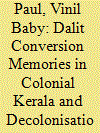

|
|
|
|
|
| Summary/Abstract |
This article seeks to decolonise knowledge of the conventional history of Dalits’ Christian conversion and its implications in colonial Kerala. As the missionary archive is the only source of Dalit Christian history writing in Kerala, in this historiography social historians have been unable to include the memories of Protestant missionary work at the local level by the local people themselves. Their experiences and rich accounts are marked by dramatic actions to gain socio-economic freedom and to establish a safe environment with the scope for future development. This article identifies how Dalit Christians themselves, in a specific locality, remember their conversion history, suggesting thereby the scope for a valuable addition to the archive.
|
|
|
|
|
|
|
|
|
|
|
|
|
|
|
|
| 8 |
ID:
185951
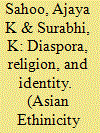

|
|
|
|
|
| Summary/Abstract |
Globalization associated with development in information and communication technologies ushered diasporas to play an important role in marketing the homeland culture globally. Among the many traditional Indian art forms that are getting visible transnationally today is the Theyyam. Theyyam is a traditional ritual art form of worship observed in the Kannur and Kasargod districts of Northern Kerala state in India. It is the folk God for North Malabaris which is accompanied by dance and other rituals. There are approximately four hundred varieties of Theyyams and several of them are performed in the diasporas. This article argues that when the Theyyam is performed transnationally, the true essence of the ritual art form changed compared to its performance in the original settings and thereby opens up for commodification. Ethnographic data for this study derives from in-depth interviews with Theyyam artists, informal conversations with Theyyam devotees and villagers besides observation of Theyyam performances.
|
|
|
|
|
|
|
|
|
|
|
|
|
|
|
|
| 9 |
ID:
102736
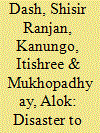

|
|
|
| 10 |
ID:
127082
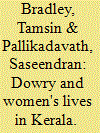

|
|
|
|
|
| Publication |
2013.
|
| Summary/Abstract |
This article presents new knowledge on the link between dowry and instances of abuse against newly married women. It draws on data collected during structured and in-depth interviews and focus groups involving 60 women in Kerala. The data argue that despite decades of campaigning by women's groups' dowry is still widely practised. Furthermore, the links between dowry, harassment and violence remain. The qualitative analysis of the data reveals how most people hold complex and seemingly contradictory views on dowry. Placing these views along a continuum with 'dowry is a problem' and 'dowry is necessary' at each end enables a picture to emerge of why dowry remains hard to eradicate. Most informants were clear that dowry represents a key problem for women; they also said they would continue to give dowry because it was the only way to secure a 'good' marriage. The data did reveal cracks in the patriarchal system; young women were direct identifying dowry as the main problem they faced. Also, indifferent views were voiced by younger men suggesting they may not forcefully act to maintain the system. Opportunities do exist to push wider holes in the system which could in turn spark the transformation still needed.
|
|
|
|
|
|
|
|
|
|
|
|
|
|
|
|
| 11 |
ID:
102114
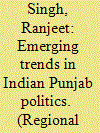

|
|
|
| 12 |
ID:
141078
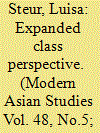

|
|
|
|
|
| Summary/Abstract |
Following the police raid on the ‘Muthanga’ land occupation by Adivasi (‘indigenous’) activists in Kerala, India, in February 2003, intense public debate erupted about the fate of Adivasis in this ‘model’ development state. Most commentators saw the land occupation either as the fight-back of Adivasis against their age-old colonization or the work of ‘external’ agitators. Capitalist restructuring and ‘globalization’ was generally seen as simply the latest chapter in the suffering of these Adivasis. Little focused attention was paid to the recent class trajectory of their lives under changing capitalist relations, the exact social processes under which they were having to make a living, and what had only recently—and still largely ambiguously—made them ready to identify themselves politically as ‘Adivasi’. Demonstrating the usefulness of ethnographic curiosity driven by an ‘expanded’ class analysis, as elaborated in Marxian anthropology, this article provides an alternative to the liberal-culturalist explanation of indigenism in Kerala. It argues instead that contemporary class processes—as experienced close to the skin by the people who decided to participate in the Muthanga struggle—were what shaped their decision to embrace indigenism.
|
|
|
|
|
|
|
|
|
|
|
|
|
|
|
|
| 13 |
ID:
171295
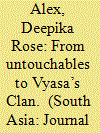

|
|
|
|
|
| Summary/Abstract |
This article examines the processes involved in the creation of a caste community called the Dheevaras in the South Indian state of Kerala in the early twentieth century. Although deemed an untouchable caste, the Dheevaras contested their untouchable status through various myths and histories, and this contestation was reflected in the Dheevara reform movement’s continuities with and departures from mainstream Hinduism and the caste system. While Dheevara reformers advocated a mainstream Hindu identity and claimed an honoured past for the community, they challenged Sanskritic Hinduism in defending the occupation of fishing. The reformers, however, strictly followed upper-caste Hindu patriarchal norms when imagining Dheevara womanhood, making women the bearers of caste honour.
|
|
|
|
|
|
|
|
|
|
|
|
|
|
|
|
| 14 |
ID:
188845
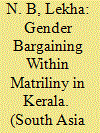

|
|
|
|
|
| Summary/Abstract |
This article presents ethnographic evidence to illustrate how Nayar women in Kerala from three different generations encounter the interplay of changed gender and property relations and seek to balance their relationships, expectations and entitlements within their natal and affinal families. Directly experiencing the dynamic intersection of property, gender and culture as well as legal and socio-cultural change, these women are seen to bargain, often quite consciously, over power and resources, including property, within patterns of matriliny that exist in a wider society influenced by dominant patriarchal norms. The article suggests that this is not as unique to Kerala as is often claimed. It makes a case, therefore, for further research on how South Asian women in the twenty-first century remain torn between matriliny and patriliny, the natal family and the husband’s family, and have to engage in multiple balancing acts to secure their rights.
|
|
|
|
|
|
|
|
|
|
|
|
|
|
|
|
| 15 |
ID:
170179
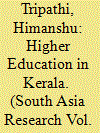

|
|
|
|
|
| Summary/Abstract |
Kerala’s advanced position in terms of literacy levels, educational achievements and other social indicators is well known. However, regarding higher education, the state displays less impressive development. The article first provides a brief overview of Kerala’s school education scenario as a base for higher education and then examines issues of access and equity related to higher education in Kerala. The findings suggest that four socio-economically backward northern districts of the state, partly facing a vicious circle of poverty and illiteracy, appear to be responsible for holding the entire state back in the rankings of present development indicators. A set of recommendations to strengthen the access and equity pillars of higher education in Kerala concludes this article, together with some comments on the relevance of vocational rather than purely academic education.
|
|
|
|
|
|
|
|
|
|
|
|
|
|
|
|
| 16 |
ID:
132270
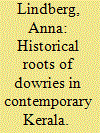

|
|
|
|
|
| Publication |
2014.
|
| Summary/Abstract |
Dowry payments from the family of the bride to that of the groom were rarely encountered in Kerala during the early twentieth century, but now are almost universal. Based on an examination of historical documents, including legislative debates, court cases, and reports, the way dowry was explained in the past is compared with the results of 200 contemporary interviews to determine its current rationale. Nowadays, making an obligatory payment for the maintenance of a wife, adherence to a social norm, and guaranteeing a woman's good treatment have displaced earlier arguments related to inheritance, status in the social hierarchy, or a woman's ability to provide for herself. Although several blurred traditions have been cited to account for dowries, they seem to have flourished in times of social inequity and uncertainty: the 1930s, 1970s, and 1990s. The emphasis on patriarchal nuclear families has created a mentality that a woman must pay for the privilege of being married and living securely.
|
|
|
|
|
|
|
|
|
|
|
|
|
|
|
|
| 17 |
ID:
122892
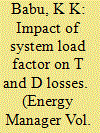

|
|
|
| 18 |
ID:
026896
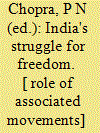

|
|
|
|
|
| Edition |
1st ed.
|
| Publication |
DelhI, Agam Prakashan, 1985.
|
| Description |
395-589p.hbk
|
| Contents |
Vol. III
Rs. 600/ per set.
|
|
|
|
|
|
|
|
|
|
|
|
Copies: C:1/I:0,R:0,Q:0
Circulation
| Accession# | Call# | Current Location | Status | Policy | Location |
| 026662 | 954.03/CHO 026662 | Main | On Shelf | General | |
|
|
|
|
| 19 |
ID:
082163
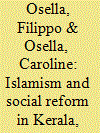

|
|
|
|
|
| Publication |
2008.
|
| Summary/Abstract |
This paper critiques ethnographic tendencies to idealise and celebrate sufi 'traditionalism' as authentically South Asian. We perceive strong academic trends of frank distaste for reformism, which is then inaccurately-and dangerously buttressing Hindutva rhetoric-branded as going against the grain of South Asian society. This often goes along with (inaccurate) branding of all reformism as 'foreign inspired' or wah'habi. Kerala's Mujahids (Kerala Naduvathul Mujahideen [KNM]) are clearly part of universalistic trends and shared Islamic impulses towards purification. We acknowledge the importance to KNM of longstanding links to the Arab world, contemporary links to the Gulf, wider currents of Islamic reform (both global and Indian), while also showing how reformism has been producing itself locally since the mid-19th century. Reformist enthusiasm is part of Kerala-wide patterns discernable across all religious communities: 1920s and 1930s agitations for a break from the 19th century past; 1950s post-independence social activism; post 1980s religious revivalism. Kerala's Muslims (like Kerala Hindus and Christians) associate religious reformism with: a self-consciously 'modern' outlook; the promotion of education; rallying of support from the middle classes. There is a concomitant contemporary association of orthoprax traditionalism with 'backward', superstitious and un-modern practices, troped as being located in rural and low-status locations.
|
|
|
|
|
|
|
|
|
|
|
|
|
|
|
|
| 20 |
ID:
097134
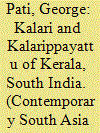

|
|
|
|
|
| Publication |
2010.
|
| Summary/Abstract |
Kalari is an arena that imparts a whole body of knowledge in Kerala, south India, including kalarippayattu (martial arts). In recent times, these centers have been exclusively referred to as cultural performance centers, corroding the intrinsic value and diluting the religious essence of such places and praxis. This essay explores kalari and kalarippayattu from a Hindu religious perspective and suggests that kalari and kalarippayattu embody the celestial and terrestrial in its spatial and corporeal representations. Divided into two sections, the essay first discusses some historical background of kalari and kalarippayattu traditions; and, secondly, from a bhakti perspective it examines kalari and kalarippayattu, proposing it to be a nexus of the celestial, corporeal, and terrestrial.
|
|
|
|
|
|
|
|
|
|
|
|
|
|
|
|
|
|
|
|
|